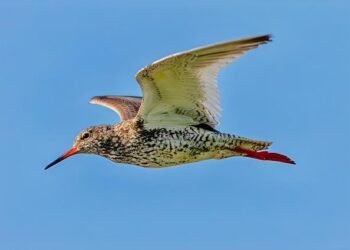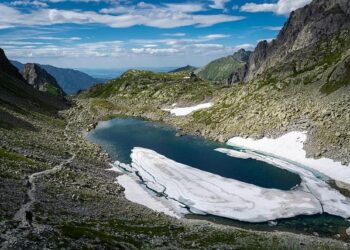Finland has appointed Kalle Kankaanpää as its new Senior Arctic Official to the Arctic Council, marking a significant step in the country’s ongoing engagement with Arctic affairs. In this exclusive interview, Kankaanpää discusses his priorities, the challenges facing the Arctic region, and Finland’s role in fostering sustainable development and international cooperation in the rapidly changing North. As the Arctic emerges as a focal point of geopolitical and environmental interest, his insights shed light on the Council’s evolving agenda and Finland’s commitment to addressing the region’s unique opportunities and risks.
Interview with Kalle Kankaanpää Explores Finland’s Strategic Priorities in the Arctic
In a revealing discussion, Kalle Kankaanpää, Finland’s newly appointed Senior Arctic Official, outlined the country’s evolving focus within the Arctic Council. Highlighting the importance of sustainable development and environmental stewardship, Kankaanpää emphasized Finland’s commitment to fostering innovation while protecting fragile ecosystems. He stressed that balancing economic opportunity with climate resilience remains a key challenge for Finland’s Arctic policy moving forward.
Among Finland’s strategic priorities, Kankaanpää identified several critical areas:
- Climate Change Mitigation: Advancing research and adaptive strategies to combat rapidly changing Arctic environments.
- Indigenous Collaboration: Ensuring that the voices of Sámi people and other indigenous communities are integral to policymaking.
- Infrastructure Development: Promoting sustainable transport and communication networks to improve connectivity.
- International Cooperation: Strengthening partnerships across Arctic nations and stakeholders.
| Focus Area | Key Objectives | Timeline |
|---|---|---|
| Environmental Monitoring | Expand satellite and ground observations | 2024-2026 |
| Renewable Energy Projects | Implement Arctic-appropriate technologies | 2025-2030 |
| Community Engagement | Increase local participation in decision-making | Ongoing |
Navigating Climate Challenges and Geopolitical Dynamics in the Arctic Council
Amidst rapidly shifting environmental conditions and heightened international interest, the Arctic Council faces unprecedented complexities. Kalle Kankaanpää emphasized that addressing climate challenges requires a balanced approach that integrates scientific research, indigenous knowledge, and sustainable development goals. The melting ice is not only transforming ecosystems but also opening new maritime routes, increasing accessibility to resources, and, consequently, geopolitical stakes. Cooperation within the Council remains crucial to avoid conflicting interests and ensure the Arctic’s fragile environment is protected.
In navigating geopolitical dynamics, Kankaanpää highlighted several pivotal factors shaping the Council’s agenda:
- Increased military presence by Arctic and non-Arctic states
- Resource competition, including oil, gas, and minerals
- Strategic partnerships balancing economic interests and environmental stewardship
He pointed out that Finland’s diplomatic efforts focus on fostering transparency, dialogue, and trust-building measures among members. Below is a summary of current Arctic stakeholders’ engagement levels:
| Stakeholder | Focus Area | Engagement Level |
|---|---|---|
| Finland | Environmental Protection & Sustainable Development | High |
| Russia | Resource Extraction & Military Presence | High |
| Canada | Indigenous Rights & Scientific Research | Medium |
| China | Maritime Routes & Economic Investment | Growing |
Kalle Kankaanpää Outlines Recommendations for Strengthening Arctic Collaboration and Sustainability
Kalle Kankaanpää, stepping into his role as Finland’s new Senior Arctic Official, emphasized the urgency of deepening cooperative frameworks among Arctic nations to ensure long-term sustainability. He highlighted that sustainable development in the Arctic must be driven by a balance between environmental protection, indigenous rights, and economic interests. In his view, reinforcing dialogue not only among governments but also with Arctic communities is crucial to crafting policies that are both effective and inclusive.
Among his key recommendations, Kankaanpää advocates for:
- Enhanced scientific research exchange to build comprehensive data on climate and ecosystem changes;
- Stronger support for indigenous leadership in decision-making processes;
- Collaborative maritime safety protocols to address increasing shipping activity;
- Investment in green infrastructure that aligns with Arctic environmental sensitivities.
| Priority Area | Proposed Action | Expected Impact |
|---|---|---|
| Research Collaboration | Establish shared Arctic data platforms | Improved climate adaptation strategies |
| Indigenous Participation | Form inclusive governance councils | Strengthened cultural preservation |
| Maritime Safety | Implement joint response drills | Reduced risk of maritime accidents |
| Green Infrastructure | Fund renewable energy projects | Lower carbon footprint in the region |
Closing Remarks
As Kalle Kankaanpää steps into his role as Finland’s new Senior Arctic Official, the Arctic Council anticipates a period of continued collaboration and proactive engagement on pressing regional issues. With his extensive experience and commitment to sustainable development, Kankaanpää is poised to influence the council’s agenda amid evolving geopolitical and environmental challenges. His leadership will be closely watched as the Arctic’s strategic importance grows on the global stage.
















